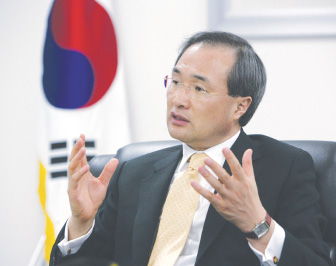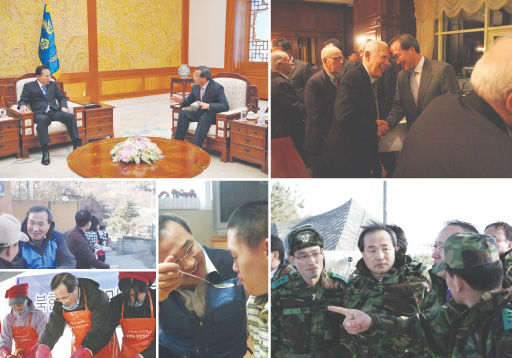¡¯NUAC Strives for National Unification¡¯
Celebrates the 30th anniversary of its inception this year
 The following are excerpts of an interview between NewsWorld and Kim Dai-sik, secretary general of the National Unification Advisory Council, who touched on President Lee Myung-bak¡¯s government policies on unification.
The following are excerpts of an interview between NewsWorld and Kim Dai-sik, secretary general of the National Unification Advisory Council, who touched on President Lee Myung-bak¡¯s government policies on unification.
Question: Will you introduce your council to our English-language NewsWorld readers, including those who are unfamiliar with the council?
Answer: The NUAC was established with the goal of mustering people¡¯s yearning for unification and strength, institutionalizing practical efforts for a peaceful unification of our nation and establishing and implementing policies on unification in a bipartisan and pan-national fashion. It is a presidential advisory council established pursuant to Article 92 of the Constitution. We have such functions as recommending and advising unification policies to the president, who chairs the council. We also conduct diverse activities to reach national consensus on unification and muster a will for unification and strength.
Q: Will you elaborate on the NUAC¡¯s internal and external activities?
A: Councilors of the NUAC are appointed by the president among people capable of making recommendations and offering advice to him by sincerely representing the people¡¯s will for unification. The current 14th council has 17,800 members from Korea and abroad. In particular, it sees its overseas members surging remarkably and the number of countries increasing from 58 to 101 while inaugurating the Chinese chapter, a long-standing task, thus laying a foundation for creating an environment conducive to unification abroad.
Q: Are councilors divided into domestic and overseas bodies?
A: That¡¯s right. There are 232 city, country and ward-based regional consultative committees in Korea and 35 regional consultative committees abroad designed to carry out regional unification projects and drives. They are charged with not only advising and suggesting unification policies through regional activities, but also building and gathering the regional community¡¯s opinions on unification and conducting diverse activities designed to expand the regional community¡¯s foundation for supporting unification.
Q: Will you specify President Lee Myung-bak¡¯s government¡¯s direction of unification policies for a democratic and peaceful unification?
A: Currently, North Korea is in a total crisis due to economic difficulties, international isolation and security misgivings. The North¡¯s complex internal issues need to be solved in order to put inter-Korean relationships on a right development track. First of all, they should gain confidence from the international community by aggressively solving the North Korean nuclear issue. If they renounce nuclear weapons development programs and concentrate on economic development as a member of the international community, intricate internal problems will be resolved at a stroke. President Lee¡¯s government¡¯s North Korean policies on co-existence and co-prosperity aim at helping the North steer toward that course.
The government policies are designed to create a new mechanism for the peace of the Korean Peninsula, dramatically raise the quality of Korean people¡¯s lives by building an inter-Korean economic community and ultimately realize a happy community pursuing the happiness of all 70 million South and North Koreans by making the peninsula an economic sphere of prosperity from a long-term perspective. This can be reckoned to be the most practical, specific and modern.
Q: Concern is now mounting over inter-Korean summits. What preconditions do you think are set for realizing such summits?
A: Our government has always proposed inter-Korean summits at any time and at any level, but under conditions that they should be ones that may yield practical outcomes. I think that the North Korean nuclear issue that can threaten the lives of 70 million Korean people should be the most important agenda of talks.
Q: When do you think is an opportune time for holding inter-Korean summits?
A: I see it better to hold inter-Korean summits at any time and any place as soon as possible. I consider the more summits the South and the North will hold, the greater the North Korean society will undergo changes. Both sides have yet to embark on a process to solve problems, however.
Q: You are considered to be one of the closest confidants of President Lee. What is your current assessment of President Lee¡¯s government after two years in office?
A: President Lee toils away day and night for the purpose of national interests, giving great encouragement to the people. I take pride in that. A survey into the opinions of the members of 232 regional consultative committees across the nation and 101 others abroad indicates that they take self-respect and pride in the current government¡¯s two years in office. Now is a time when not only Cheong Wa Dae aides but also all other assistants of President Lee should be more humble, approach people closer and more attentively listen to their voices.
Q: You¡¯re in your third year since taking office as the secretary general of the NUAC. What are you trying to overhaul while at the helm of the organization?
A: This year marks the 30th anniversary of the establishment of the NUAC. The council is considered to be lagging. I am striving to break the mold of the council in order for it to renew itself. The NUAC is a body established to help both people across the nation and the 7 million overseas Korean residents brace themselves for unification. The issue of unification is not just a matter of politicians and academics, but also a national task all the people should participate in altogether and address. This is the reason the NUAC must be a national organization, and the council will be transformed into a council genuinely beloved and trusted by people. nw
NUAC Secretary General Kim Dai-sik
(clockwise) President Lee receives a briefing on the NUAC from NUAC Secretary General Kim Dai-sik after giving an appointment document to Kim on Sept. 2, 2008.; NUAC Secretary General Kim hosts a dinner on Feb. 26, 2009 for Turkish veterans who participated in the Korean War, in Istanbul,; Unification Minister Hyun In-taek, accompanied by Kim, tours a frontline post on Dec. 18, 2009.; Kim tours a facility for the physically handicapped on June 2, 2009.; Kim participating in a volunteering activity for North Korean refugees on Nov. 26, 2009,; and Kim delivers coal briquettes to the poor with NUAC staff members on Dec. 18, 2008
Photo by courtesy of the NUAC
3Fl, 292-47, Shindang 6-dong, Chung-gu, Seoul, Korea 100-456
Tel : 82-2-2235-6114 / Fax : 82-2-2235-0799